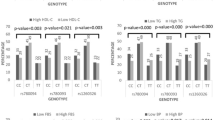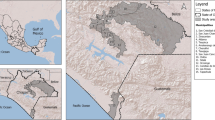Abstract
Background
The metabolic syndrome consists of a combination of metabolic abnormalities and genetic predisposition that both contribute significantly to its development. Numerous studies have established a strong association between single nucleotide polymorphisms (SNPs) of the rs7903146 variant in the TCF7L2 gene and the metabolic syndrome (MetS) as well as type 2 diabetes.
Objective
The aim of this study was to assess the impact of rs7903146 on MetS and its components.
Methods
For this cross-sectional study, 325 individuals aged 25 to 86 who were selected from the baseline data of the Ahvaz cohort study were examined. Body mass index, blood pressure, fasting blood glucose, total cholesterol (TC), high-density lipoprotein cholesterol (HDL-C), and triglycerides (TG) were measured following standard protocols. MetS subjects were identified based on the National Cholesterol Education Program guidelines. Genotyping was conducted using the PCR-RFLP method.
Results
Our findings revealed that individuals with the CT genotype of rs7903146 had an increased risk of MetS (OR 2.24; 95% CI, 1.26–3.98; p < 0.006). This genotype was also found to be associated with a higher risk of hypertension and low HDL cholesterol (p < 0.05). Moreover, plasma triglyceride levels were slightly higher in individuals with TT and CT genotypes, although not significantly so (p = 0.06).
Conclusion
In conclusion, the CT genotype of the TCF7L2 rs7903146 polymorphism exhibited higher odds for MetS. While lifestyle factors and other genes are also implicated in MetS, our findings suggest that studying TCF7L2 polymorphisms in high-risk groups could contribute to the development of genotype-specific prevention or treatment strategies. However, further research is required to validate these results.
Similar content being viewed by others
Data Availability
Data will be made available on request.
References
Yeh W-T, Weng L-C. Epidemiology of metabolic syndrome in Asia. Asia Pac J Clin Nutr. 2008;17:37–42.
Payab M, Hasani-Ranjbar S, Merati Y, Esteghamati A, Qorbani M, Hematabadi M, et al. The prevalence of metabolic syndrome and different obesity phenotype in Iranian male military personnel. Am J Men’s Health. 2017;11(2):404–13.
Grundy SM. Metabolic syndrome update. Trends Cardiovasc Med. 2016;26(4):364–73.
Wagner R, Staiger H, Ullrich S, Stefan N, Fritsche A, Häring HU. Untangling the interplay of genetic and metabolic influences on beta-cell function: examples of potential therapeutic implications involving TCF7L2 and FFAR1. Mol Metab. 2014;3(3):261–7.
Schinner S. Wnt-signalling and the metabolic syndrome. Horm Metab Res. 2009;41(2):159–63.
Vykoukal D, Davies MG. Vascular biology of metabolic syndrome. J Vasc Surg. 2011;54(3):819–31.
Grundy SM, Cleeman JI, Daniels SR, Donato KA, Eckel RH, Franklin BA, et al. Diagnosis and management of the metabolic syndrome: an American Heart Association/National Heart, Lung, and Blood Institute scientific statement. Circulation. 2005;112(17):2735–52.
Ip W, Chiang Y-tA, Jin T. The involvement of the wnt signaling pathway and TCF7L2 in diabetes mellitus: the current understanding, dispute, and perspective. Cell Biosci. 2012;2(1):1-12.
Cauchi S, Froguel P. TCF7L2 genetic defect and type 2 diabetes. Curr Diab Rep. 2008;8(2):149–55.
Hosseinpour-Niazi S, Bakhshi B, Zahedi A-S, Akbarzadeh M, Daneshpour MS, Mirmiran P, et al. TCF7L2 polymorphisms, nut consumption, and the risk of metabolic syndrome: a prospective population based study. Nutr Metab. 2021;18(1):1–11.
Ebrahimi-Mameghani M, Asghari-Jafarabadi M, Rezazadeh K. TCF7L2-rs7903146 polymorphism modulates the effect of artichoke leaf extract supplementation on insulin resistance in metabolic syndrome: a randomized, double-blind, placebo-controlled trial. J Integr Med. 2018;16(5):329–34.
Sousa AGP, Marquezine GF, Lemos PA, Martinez E, Lopes N, Hueb WA, et al. TCF7L2 polymorphism rs7903146 is associated with coronary artery disease severity and mortality. PLoS One. 2009;4(11): e7697.
Shahbazian H, Latifi SM, Jalali MT, Shahbazian H, Amani R, Nikhoo A, et al. Metabolic syndrome and its correlated factors in an urban population in South West of Iran. J Diabetes Metab Disord. 2013;12(1):1–6.
Ghaedrahmat Z, Cheraghian B, Jaafarzadeh N, Takdastan A, Shahbazian HB, Ahmadi M. Relationship between urinary heavy metals with metabolic syndrome and its components in population from Hoveyzeh cohort study: a case-control study in Iran. J Trace Elem Med Biol. 2021;66: 126757.
Shahbazian H, Latifi SM, Jalali MT, Shahbazian H, Amani R, Nikhoo A, et al. Metabolic syndrome and its correlated factors in an urban population in South West of Iran. J Diabetes Metab Disord. 2013;12(1):11.
Povel C, Boer J, Reiling E, Feskens E. Genetic variants and the metabolic syndrome: a systematic review. Obes Rev. 2011;12(11):952–67.
Cauchi S, Meyre D, Dina C, Choquet H, Samson C, Gallina S, et al. Transcription factor TCF7L2 genetic study in the French population: expression in human β-cells and adipose tissue and strong association with type 2 diabetes. Diabetes. 2006;55(10):2903–8.
Warodomwichit D, Arnett DK, Kabagambe EK, Tsai MY, Hixson JE, Straka RJ, et al. Polyunsaturated fatty acids modulate the effect of TCF7L2 gene variants on postprandial lipemia. J Nutr. 2009;139(3):439–46.
Ding W, Xu L, Zhang L, Han Z, Jiang Q, Wang Z, et al. Meta-analysis of association between TCF7L2 polymorphism rs7903146 and type 2 diabetes mellitus. BMC Med Genet. 2018;19:1–12.
Mustafa S, Younus D. Association of TCF7L2 RS7903146 polymorphism with the risk of type 2 diabetes mellitus (T2DM) among Kurdish population in Erbil Province, Iraq. Ind J Clin Biochem. 2021;36(3):312–8.
Amoli MM, Amiri P, Tavakkoly-Bazzaz J, Charmchi E, Hafeziyeh J, Keramatipour M, et al. Replication of TCF7L2 rs7903146 association with type 2 diabetes in an Iranian population. Genet Mol Biol. 2010;33:449–51.
Assmann TS, Duarte GC, Rheinheimer J, Cruz LA, Canani LH, Crispim D. The TCF7L2 rs7903146 (C/T) polymorphism is associated with risk to type 2 diabetes mellitus in Southern-Brazil. SciELO Brasil. 2014:918–925.
Zheng X, Ren W, Zhang S, Liu J, Li S, Li J, et al. Association of type 2 diabetes susceptibility genes (TCF7L2, SLC30A8, PCSK1 and PCSK2) and proinsulin conversion in a Chinese population. Mol Biol Rep. 2012;39:17–23.
Marzi C, Huth C, Kolz M, Grallert H, Meisinger C, Wichmann H-E, et al. Variants of the transcription factor 7-like 2 gene (TCF7L2) are strongly associated with type 2 diabetes but not with the metabolic syndrome in the MONICA/KORA surveys. Horm Metab Res. 2007;39(01):46–52.
Saadi H, Nagelkerke N, Carruthers SG, Benedict S, Abdulkhalek S, Reed R, et al. Association of TCF7L2 polymorphism with diabetes mellitus, metabolic syndrome, and markers of beta cell function and insulin resistance in a population-based sample of Emirati subjects. Diabetes Res Clin Pract. 2008;80(3):392–8.
Hirschhorn JN, Lohmueller K, Byrne E, Hirschhorn K. A comprehensive review of genetic association studies. Genet Med. 2002;4(2):45–61.
Al-Homedi Z, Afify N, Memon M, Alsafar H, Tay G, Jelinek HF, et al. Genetic studies of metabolic syndrome in Arab populations: a systematic review and meta-analysis. Front Genet. 2021;12:733746.
Bonnet F, Roussel R, Natali A, Cauchi S, Petrie J, Laville M, et al. Parental history of type 2 diabetes, TCF7L2 variant and lower insulin secretion are associated with incident hypertension. Data from the DESIR and RISC cohorts. Diabetologia. 2013;56(11):2414–23.
Melzer D, Murray A, Hurst AJ, Weedon MN, Bandinelli S, Corsi AM, et al. Effects of the diabetes linked TCF7L2polymorphism in a representative older population. BMC Med. 2006;4(1):1–8.
Perez-Martinez P, Perez-Caballero AI, Garcia-Rios A, Yubero-Serrano EM, Camargo A, Gomez-Luna MJ, et al. Effects of rs7903146 variation in the Tcf7l2 gene in the lipid metabolism of three different populations. 2012;7(8):e43390.
Funding
This study was supported by grants from Ahvaz Jundishapur University of Medical Sciences (IR.AJUMS.REC.1397.137) and experimentally done in Department of Laboratory Sciences, Iran.
Author information
Authors and Affiliations
Contributions
NM conceived and supervised the study; MR and HS performed experiments; MTB and BC analyzed data; ND and MR wrote the paper. All authors read and approved the final manuscript.
Corresponding author
Ethics declarations
Conflict of interest
The authors declare no competing interests.
Ethical clearance, consent of participant
The study protocol was approved by the Research Ethics Committee of Ahvaz Jundishapur University of Medical Sciences (HLRC-9505), and informed consent was obtained from all participants.
Additional information
Publisher's Note
Springer Nature remains neutral with regard to jurisdictional claims in published maps and institutional affiliations.
Rights and permissions
Springer Nature or its licensor (e.g. a society or other partner) holds exclusive rights to this article under a publishing agreement with the author(s) or other rightsholder(s); author self-archiving of the accepted manuscript version of this article is solely governed by the terms of such publishing agreement and applicable law.
About this article
Cite this article
Rahimi, M., dinarvand, N., Shahbazian, H. et al. Association of the rs7903146 variant (IVS3C> T) of TCF7L2 with the prevalence of the metabolic syndrome and its components in population from Ahvaz cohort study: a case-control study in Iran. Int J Diabetes Dev Ctries (2023). https://doi.org/10.1007/s13410-023-01286-1
Received:
Accepted:
Published:
DOI: https://doi.org/10.1007/s13410-023-01286-1




